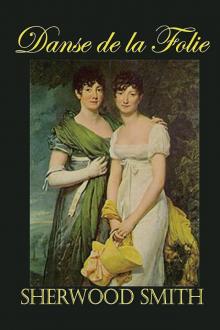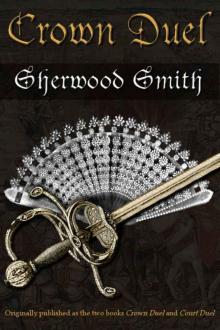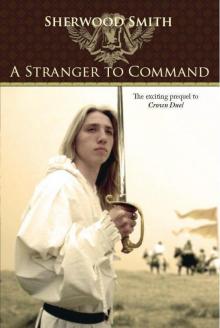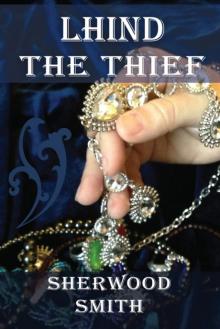- Home
- Sherwood Smith
Danse De La Folie Page 4
Danse De La Folie Read online
Page 4
“And nary a bit of land goes with my airy title,” Edward said, as the servants’ door opened, and in came the butler and a footman bearing heavy silver trays. “Much less money. All gobbled up in St. Tarval long ago. But as I said, it sounded fine at Eton—” He had unbuttoned the heavy roquelaure as he spoke, then looked down in dismay. “Hey day! My boots! I’d better change or Mrs. Finn will...” He bit off what he was going to say, and vanished precipitously, chased by Kitty, whose voice could be heard, “Oh Ned, I did so want to show Miss Harlowe that we are not completely uncivilized...”
Clarissa was left sitting at a table alone, with two servants standing by, holding heavy trays, as another door opened, and a gentleman entered, tall and mild of manner, his hazel gaze and curly black hair instantly familiar. Here was the gentleman who had rescued them.
The marquess bowed to Clarissa. “I trust you are recovered, Miss Harlowe? Now, where have my brother and sister gone off to? Here, Clemens, go ahead and serve. They are sure to appear before things get cold.”
As he spoke, he sat at the head of the table, and kept up a mild commentary to his servants as they set out the meal, which gave Clarissa time to recover.
His siblings reappeared as the servants departed, Kitty saying happily, “Oh, there you are, Carlisle. Have you two become acquainted? I hope so, for I do not want to perform another introduction, not without practice.”
“We’ve all met,” Edward said breezily, sitting down in a more fashionable coat that was slightly too short, making Clarissa wonder if she was seeing the last of Lord Decourcey’s Eton wardrobe.
As the Decourcey family settled to the meal, Clarissa took the opportunity to covertly study her host. She was aware of extreme ambivalence as well as interest: this man, though polite, and her rescuer, had taken his brother and his sister out on the water as smugglers. And though she knew she owed him her life, she wondered if he had inherited those qualities that had earned his father a troubling reputation.
He certainly looked the gentleman. He might not have the perfect Grecian profile of her cousin Devereaux, who was the target of many young ladies in London, but his mouth was well-shaped, and his countenance pleasing; the Bedford crop was particularly flattering to the shape of his head, for he did not wear his hair unfashionably long, nor too short.
When he happened to glance her way and their eyes met, she became aware that she was staring, and hastily confined her gaze to her plate.
The food was plentiful and excellent, the conversation easy, without any reference to smuggling or Riding Officers.
At the end of the meal, after a couple of meaningful glances from the marquess (in so kindly a manner that Clarissa found her estimation of him improving decidedly), Kitty sat up. “Oh!” She blushed as she invited Clarissa to withdraw, which they did with correct punctilio.
The two ladies settled in the small paneled chamber next door, where a good fire crackled merrily, not quite subduing the odor of mildew. Chairs had been brought from under Holland covers and polished.
Having established Clarissa by the fire, Kitty excused herself to change her shawl, an excuse that was patently false when her voice rose plainly through the connecting door: “Ned! I will expire if you do not tell if me you successfully delivered the cargo.”
Edward’s voice was even clearer than his sister’s. “What we could save of it. Deuce take that yacht captain—what was he at, so far off course? How are we going to repair the damage?”
“It’s all the fault of that evil Talkerton,” Kitty declared.
The marquess’s quiet voice came clearly: “No, the fog was at fault—that and the fact that the wind died, setting the yacht adrift. And Talkerton is not evil. He’s merely a man employed by the government to what he considers an honest end, though it’s one I do not envy. And he knows quite well what our father was at, and that the older men in the countryside were in league with him. The evil, if any exists, I think lies with that innkeeper Dobbs, who I suspect is lying. He knows well there isn’t anyone we can complain to.”
“If Father were alive, that villain Dobbs wouldn’t be whispering about thin markets, and the rest of it, so he can cheat us,” Edward declared in a ringing tone.
Clarissa looked around in despair. The room was too small for any corner to be safe from eavesdropping. There was another door, but if she were to go through it, what would be the result except further embarrassment? Ah, but in the sideboard in the corner, there were books. She pulled a random volume of Rollins.
The marquess said, “Kit, did you visit the tenants this afternoon?”
“As soon as Mrs. Latchmore and Mr. Bede were gone. Everyone was snug. One of the outbuildings at Highgate Farm was damaged in the storm, that was all.”
“Cottage Row?”
“Sound, all sound. Old Widow Iverson said to convey her thanks for the rethatching, and she will put up supernumerary mint jelly for us. Little profit, then? Mrs. Finn read me such a lecture for going out.”
“She nabbed me on my way downstairs,” Edward said.
“And I, on my way in from the stable,” the marquess stated. “If there is money to be made in free trading, I am not convinced we have the way of it. I mislike having to deal with that rascal Dobbs, but Father’s old connections seem to have vanished, and as I told you before, I would hate to meet the Amelia in the Channel. Proby and I served together aboard the Tarleton, and he would be sick if he caught us.”
“You’d think he’d look the other way,” Ned said. “No, no, don’t say a word on it. I know that you don’t put a friend to such a choice, but dash it, Carl, winter’s not over, there’s yet a couple of new moons before the days get longer, and we did promise the Cowman—”
“Cowman,” Kitty interrupted. “You would think your mysterious organizer, and I do not think much of his abilities, would have the wit to think of a better nom de guerre.”
“Egad, Kit, left up to you he’d be Lord L’Inconnu or Comte de Sinistro, or some rubbishing name—”
His voice had risen, until the marquess broke in dulcetly. “Or the Count de Treasure.”
The other two broke into laughter, and Kitty said, “I should return to our guest, before she wonders if I am knitting a new wrap.”
“Oh! I nearly forgot Miss Harlowe,” Edward said. “A guest in this house, do you know what this means?”
“I am afraid to ask,” the marquess responded.
“That we now have a fourth for whist,” his brother said triumphantly.
“I hope she doesn’t play,” was the retort from his sister.
By the time Kitty reappeared, Clarissa had been able to make a fair attempt at her book, so that she could look up naturally.
“We shall have tea brought in a moment,” Kitty said, and then tilted her head. “How do you feel? Are you quite fagged? The bruise looks very tender still.”
“I am well enough,” Clarissa replied.
“Should you like to play a rubber or two of whist with us?”
There was, of course, no answer to be made but an affirmative. Clarissa was used to such games, and prepared to be sadly bored. Much to her surprise, she wasn’t: the marquess and his brother and sister did not quarrel over the cards as her brother and her eldest half-sister so frequently had at home, for one thing, and for another, they were excellent players.
As Ned said cheerfully, when totting up points after the first game, “When you have little to do and many hours to do it in, you become a real Captain Sharp. Shall we play for our old stakes?”
Kitty said to Clarissa, “What we do is play a hundred guineas a point. It’s quite fun to win and lose enormous sums, and at the end of the evening, we throw the papers into the fire.”
“Do not feel yourself obliged, Miss Harlowe,” the marquess said to their guest, who when sodden and half-frozen had seemed self-possessed, and now sat there with calm poise.
But then she laughed, and it transformed her face.
The marquess was unaware of his entry into
the danse as hero; in that moment he was unaware of his brother or sister, or the cards he still held in his hand.
And Clarissa was only aware of the fact that she’d never heard of such a thing. But if one took a moment to consider, was it not more sensible than the particulars of gaming as generally accepted? “I quite understand,” she said. “And I confess I consider it perfectly sensible.”
“Here, Carl, give me those. Unless you intend to play that as your next hand?” Ned looked inquiringly at his brother, who apologized and relinquished the playing cards.
He made an effort, recollected himself, and Ned dealt.
And so it was that by the end of the evening, Clarissa had won fifty thousand pounds, but had lost nearly two hundred thousand, and she had never known an evening to pass so fast in her life.
The bell had chimed midnight before they broke up the party, Edward pitching their scribbled IOUs into the fire. “And there goes my coronet, a string of racers, and a phaeton,” he said cheerfully, as the marquess handed the ladies their candles to light their way upstairs.
o0o
The next morning, Clarissa woke to stormy weather. The ache in her head had faded. She felt a dull pang only if she touched the bruise. One glance out at the low gray sky and the ghostly branches nearly hidden in the whirl of white, and she knew that few would be traveling this day.
While she sipped at the tea that Rosina brought her, downstairs, the brothers met, the younger surprised to find the elder in the dining room rather than the kitchen, as was his wont. He thought nothing of it beyond a reflection on how they must remember their manners, now that Miss Harlowe was among them.
The marquess’s reflections were more troubling. Nature had fashioned an energetic young man whose sense of fun led him to enjoy being outdoors in all weathers, but circumstances had made him serious before young men customarily settle down. He found himself responsible for the languishing estate before he inherited it, with the inevitable result: he worked very hard, and spent a great deal of time contriving ways to deal with disasters, and to brace for the next.
He did not regard Miss Harlowe as a disaster, but he had woken aware that the previous evening’s pastime had been the most enjoyable ever, and that was in large part due to their guest. It wasn’t that Miss Harlowe was exceptionally witty, or indeed, that she had claimed more than her share of conversation. It was the way she had appeared to enjoy the silliness, an attribute that in the cold light of morning he had to attribute to excellent manners.
A well-bred young lady used to the ways of London could hardly be expected to be entertained by a family party round an old table in a tumbledown barrack of a house. He must not think anything beyond that. It was a firm decision—and yet when he found himself twice looking expectantly at the door, he outlined a day’s worth of labor that would keep him and his brother.
Ned whistled as they departed, wondering if the weather was what got a burr under Carl’s saddle.
Kitty and Clarissa came down soon after they left. Clarissa had waited until she heard Kitty’s step creaking on the wooden floor outside her door. She did not wish to go down alone and perhaps cause an awkward encounter with anyone else in the family.
Kitty had woken up remembering a certain humiliating encounter when she had tried to go into company once before. Knowing that she had no social experience, during breakfast she scrupulously adopted what she hoped was the proper demeanor of a young lady of Society.
The result? At the end of the meal, Clarissa rose, and said softly and apologetically, “Forgive me, please, for the imposition of my presence. There is no need to abjure the order of your day in my favor.”
“Oh,” Kitty exclaimed, so dismayed she forgot her careful formality of manner. “Of course, if you wish to be alone, I quite comprehend.”
Clarissa regarded her gravely. “I do not wish to trespass on your time as I have in your home, Lady Catherine.”
Kitty clasped her hands. How to answer?
“I wish you would call me Kitty,” she said tentatively. “Lady Catherine is what my grandmother insisted upon, and I know it is proper, but it makes me feel that I am being scolded.”
Clarissa’s puzzlement vanished; she recognized in the substantive change in manner that her hostess had been acting a part, one perhaps that she thought was expected. “I, too, have a brother,” she ventured. “He will forget what is due to visitors and family, and my sisters are lively. So we are informal among ourselves. If you would not consider it pushing, do call me Clarissa.”
Kitty’s face transformed. “Well, if that is the case, then, pray come to my parlor. You may speak when you like, or not, as you please.”
They ascended to Kitty’s private chamber, which was warm and snug. Kitty moved at once to the little secretaire, with a furtive look. She sat down with a bit of unnecessary bustle, moving her chair, resettling her skirts, and then restacking a quire of papers, all with occasional glances Clarissa’s way.
Clarissa perused the small shelf of books. She had read them all, for none were more recent than twenty years, and the greater number were improving works. A schoolboy edition of Rollins’ Ancient History—battered from much rereading, unlike the leather-bound Rollins downstairs, which Clarissa suspected had never been opened—rested on the top shelf, along with tomes of an instructive nature by Wilberforce, Macaulay, and Hannah More.
Below those, far more well-worn, the works of novelists. She selected The Fortunate Foundlings, which her grandmother had once said was her mother’s favorite.
For a time there was only the rustle of pages and the scratch of Kitty’s pen on her foolscap.
Then the scritch-scratch ceased, and when Clarissa looked up, she discovered her hostess regarding her with a curious demeanor.
“I see you are reading a novel,” Kitty ventured. “I gather you are not an enemy of novels?”
“I read them with great pleasure.”
Kitty made a deprecating gesture. “I know those are all horridly old-fashioned. Though Cecelia is one of my favorites.” She said in a rush, “And you know, it is one of the very few that carried beyond the marriage, and so I—” Kitty resolutely controlled the impulse to confide her most cherished secret.
But then she dared to raise her eyes, and found only sympathetic interest in her guest, and so the words came tumbling out. “The truth is, pray do not—that is, I trust, I hope, you will not be offended, but the truth is, I am minded to help my brother by commencing author.” And at Clarissa’s look of surprise, “Situated as I am, it is unlikely I will make a great marriage. Or any marriage at all. But Carlisle is in desperate need of...” Aware that she was compounding her error by vulgar reference to money, Kitty twisted her fingers together and mutely regarded her guest.
“It is a laudable plan,” Clarissa said. “Can one prosper by the pen?”
“It stands to reason,” Kitty said eagerly. “Does it not? If everyone in England has heard of Dr. Johnson, and buys his books, would not that add up to an immense sum? And from what I have heard, novels are more popular, are they not?”
“People certainly do talk about them at least as much as they talk about plays or music.”
Kitty went on, “It seems to me that one must write a story that pleases everyone, so that each household will want their copy. We have talked about this a great deal. Ned said he would visit the booksellers on my behalf, if I just get it finished and copied out fair.”
“How do you go about pleasing everyone?” Clarissa asked.
“Why, you have elements to please all. There must be romantic and tender thoughts for the ladies, and fashion as well. There must be danger and striving for the gentlemen. Perhaps some great thoughts for those older, and instruction for those younger, though Ned says that they yawn over that in school, and what you really want when young is something humorous. But the young don’t buy their books, do they? Do not their guardians buy them, always looking out something instructive?”
“Your elder brother. Wh
at says he to this laudable plan?”
“Oh, Carlisle says I may do what I wish. He engages only for a different story than the usual moldering castle and abductions by Greek banditti. He thinks if I were to write a romance entirely modern, it would do well through being something new, especially if it might be witty.”
Clarissa could not help but agree.
Kitty had been observing her closely, and tipped her head. “Yes, I see you think so, too. And I would agree! But how can I write about modern manners when I am never to go into society? At least with Greek banditti, no one in England has seen them, so they cannot scoff and point out how I got it wrong. And,” she finished, waving her quill in triumph, “I am ahead in that I can have them converse in their own tongue. I never thought I would get any use out of helping Ned get up his Thucydides during the holidays, for he isn’t bookish.”
“Except... forgive me, but would banditti converse in the classical mode of Thucydides?” Clarissa asked.
“Carlisle asked that, too,” Kitty said. “But I said, since we haven’t any examples of banditti speech, why should they not?” And when her guest smiled, making a gesture of acceptance, Kitty confided further, “As for Greek banditti and the like, one must write about something. I know what a moldering castle feels like, as I live in one. That is, a moldering house. I know it’s not a castle, and really, I’d as lief not live in one if it’s all to be stone, with a noisome donjon and moat. But that is beside my point.” She determinedly wrenched herself back to her topic, “I know nothing of what goes on in society, as someone hinted once.” Kitty looked down, her face red. “So I might just as well add in some exciting chapters about banditti, because at least I’ve read about them. This is another reason why I wished to go aboard the cutter, so I could add some chapters about smugglers from my own witness. Only I thought I might make them over into pirates.”
Clarissa wondered who would be so mean-spirited as to hint about ignorance of society and not offer to amend her hostess’s knowledge, but she forbore questioning, and so the two returned to reading and writing respectively, in perfect charity with one another.

 Inda
Inda Danse De La Folie
Danse De La Folie King's Shield
King's Shield Whispered Magics
Whispered Magics Fleeing Peace
Fleeing Peace Barefoot Pirate
Barefoot Pirate Crown Duel
Crown Duel Mearsies Heili Bounces Back
Mearsies Heili Bounces Back Commando Bats
Commando Bats A Stranger to Command
A Stranger to Command Lhind the Spy
Lhind the Spy The Spy Princess
The Spy Princess Blood Spirits
Blood Spirits Sasharia en Garde
Sasharia en Garde Lhind the Thief
Lhind the Thief Paradise Drift
Paradise Drift Banner of the Damned
Banner of the Damned The Trouble With Kings
The Trouble With Kings Poor World
Poor World Treason's Shore
Treason's Shore Wren Journeymage
Wren Journeymage A Posse of Princesses
A Posse of Princesses Revenant Eve
Revenant Eve Once a Princess
Once a Princess Time of Daughters I
Time of Daughters I Rondo Allegro
Rondo Allegro Coronets and Steel
Coronets and Steel Over the Sea
Over the Sea Senrid
Senrid Hunt Across Worlds
Hunt Across Worlds A Sword Named Truth
A Sword Named Truth The Fox
The Fox Twice a Prince
Twice a Prince Fair Winds and Homeward Sail: Sophy Croft's Story
Fair Winds and Homeward Sail: Sophy Croft's Story Time of Daughters II
Time of Daughters II The Rifter's Covenant
The Rifter's Covenant The Phoenix in Flight
The Phoenix in Flight Stranger
Stranger The Thrones of Kronos
The Thrones of Kronos A Prison Unsought
A Prison Unsought Twice a Prince: Sasharia En Garde Book 2
Twice a Prince: Sasharia En Garde Book 2